Business Report: Legal and Legislative Risks in the Hotel Industry
VerifiedAdded on 2021/02/18
|7
|1939
|72
Report
AI Summary
This report examines the legal and legislative risks that managers and employees in the hotel industry face. It covers key areas such as liability under the Hotel Proprietors Act 1956, emphasizing the importance of security, data protection, and cyber security measures. The report also discusses health and safety regulations, including electrical wiring, food hygiene standards, and risk management strategies. Licensing requirements and the need for continuous employee training are highlighted. The conclusion underscores the significance of business skills in managing hotel operations and mitigating risks, particularly in ensuring food safety and adhering to all relevant legal requirements.
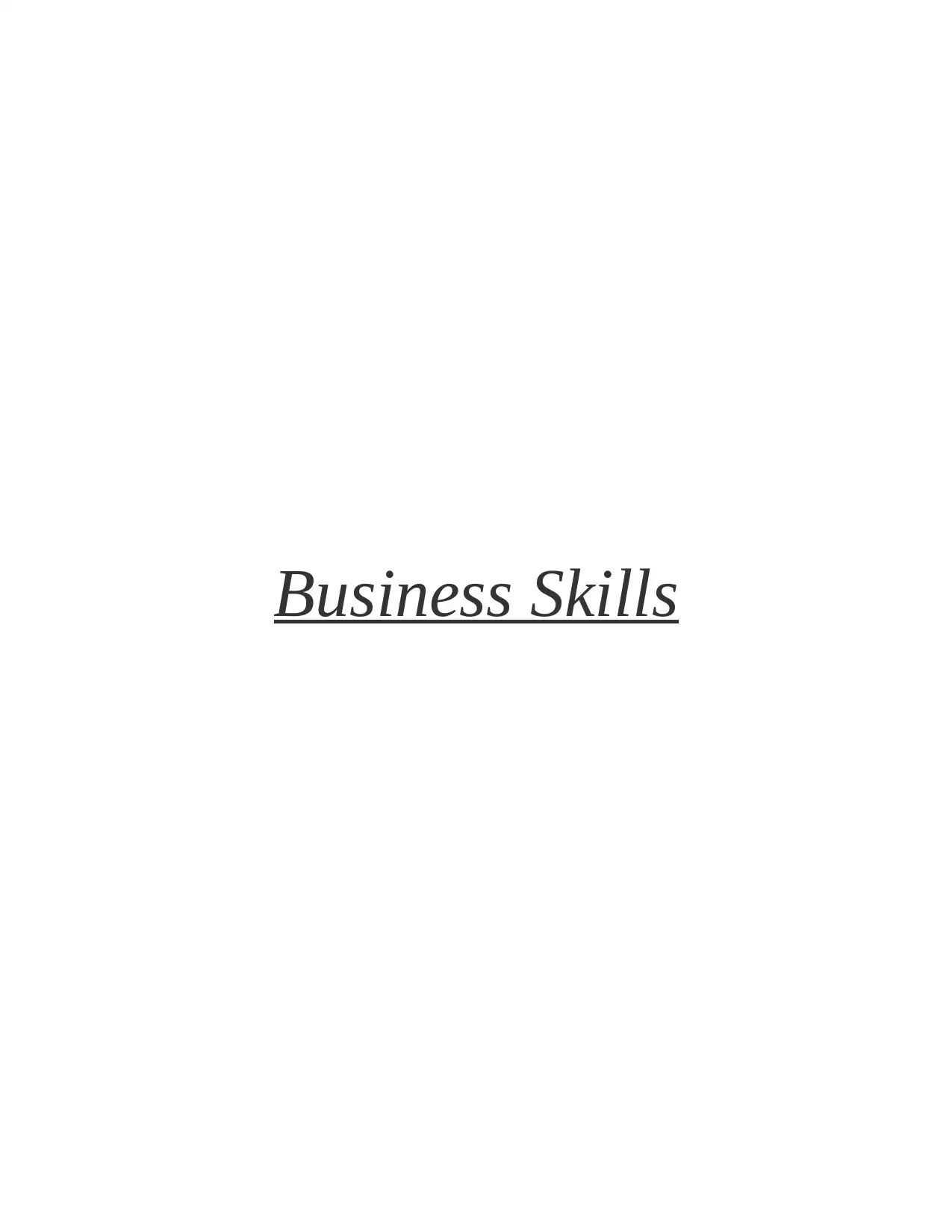
Business Skills
Paraphrase This Document
Need a fresh take? Get an instant paraphrase of this document with our AI Paraphraser
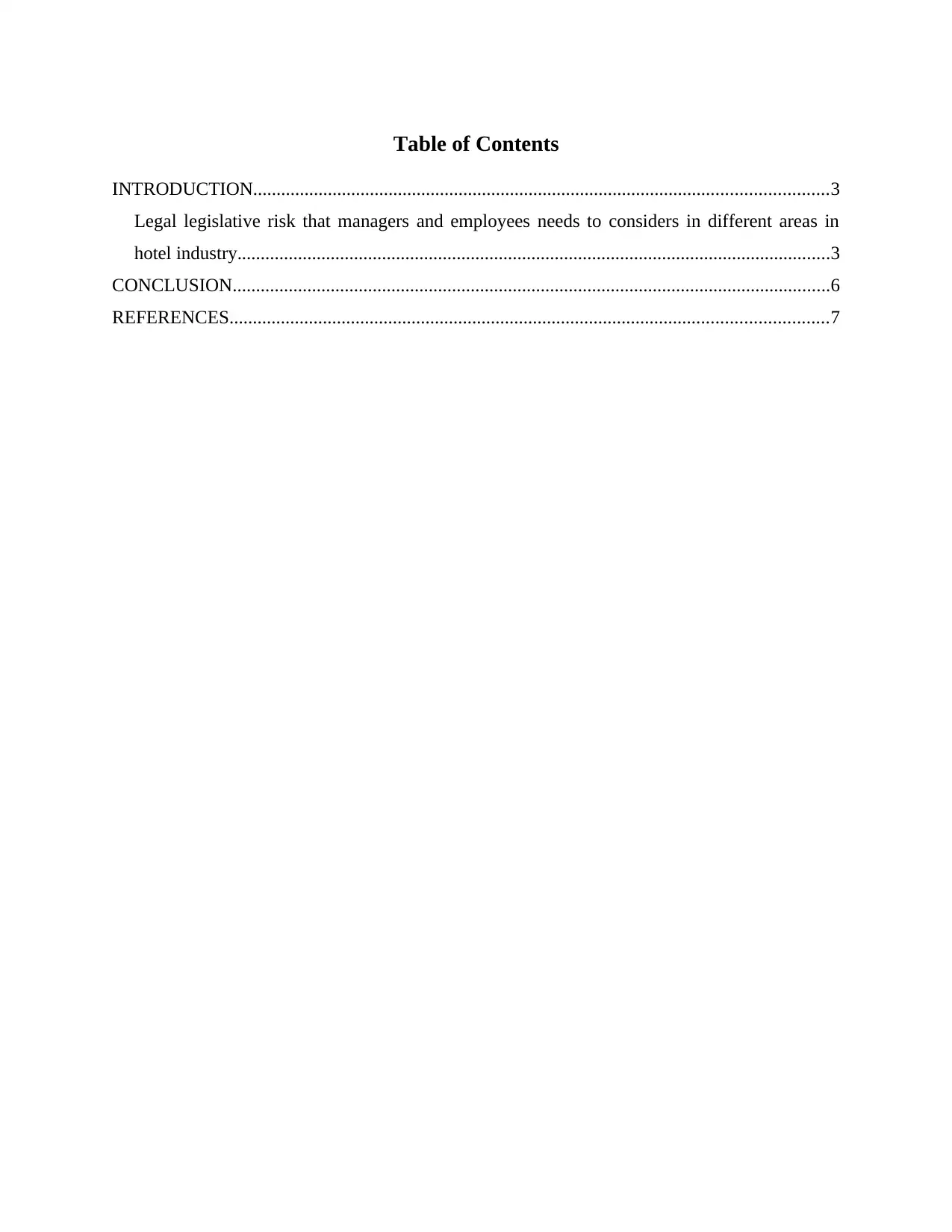
Table of Contents
INTRODUCTION...........................................................................................................................3
Legal legislative risk that managers and employees needs to considers in different areas in
hotel industry...............................................................................................................................3
CONCLUSION................................................................................................................................6
REFERENCES................................................................................................................................7
INTRODUCTION...........................................................................................................................3
Legal legislative risk that managers and employees needs to considers in different areas in
hotel industry...............................................................................................................................3
CONCLUSION................................................................................................................................6
REFERENCES................................................................................................................................7
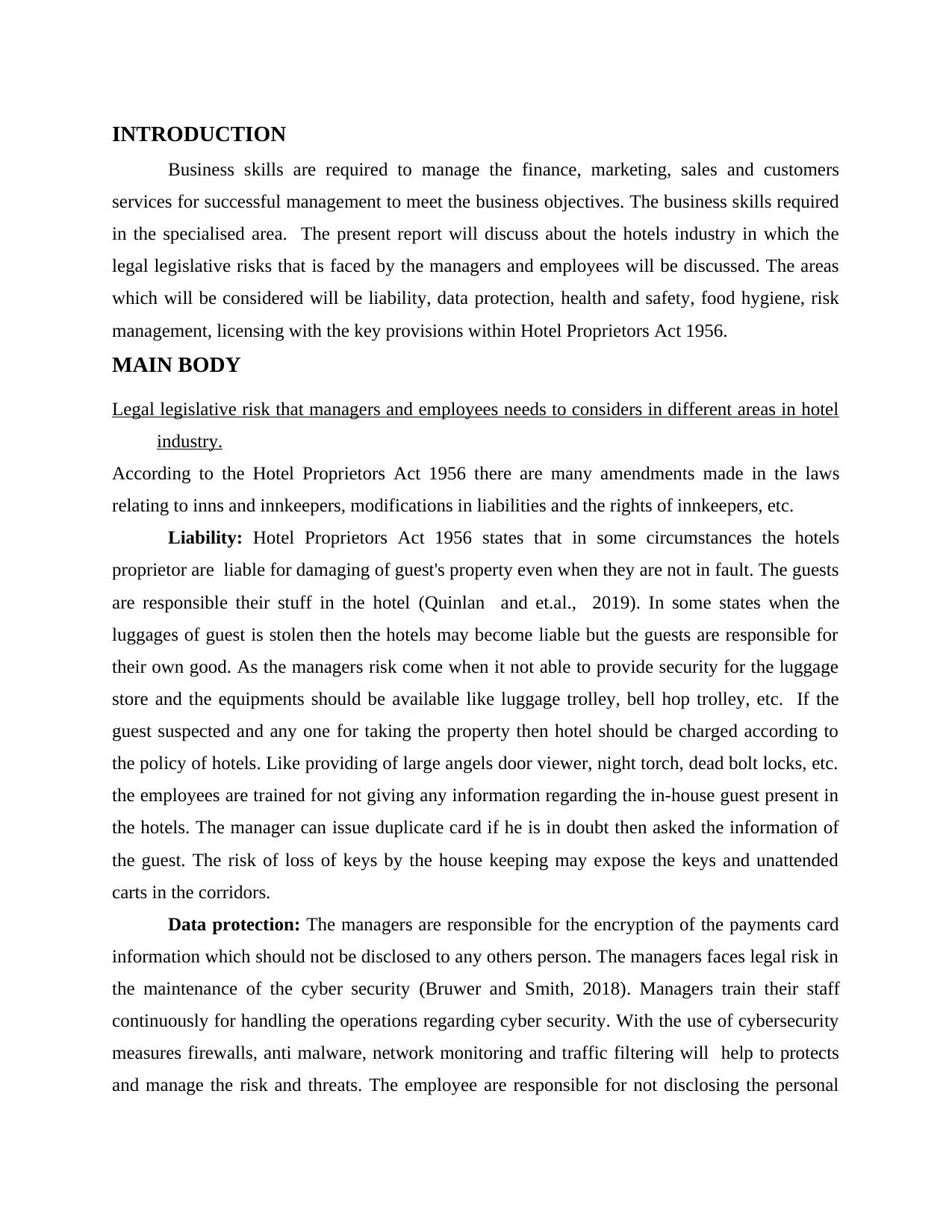
INTRODUCTION
Business skills are required to manage the finance, marketing, sales and customers
services for successful management to meet the business objectives. The business skills required
in the specialised area. The present report will discuss about the hotels industry in which the
legal legislative risks that is faced by the managers and employees will be discussed. The areas
which will be considered will be liability, data protection, health and safety, food hygiene, risk
management, licensing with the key provisions within Hotel Proprietors Act 1956.
MAIN BODY
Legal legislative risk that managers and employees needs to considers in different areas in hotel
industry.
According to the Hotel Proprietors Act 1956 there are many amendments made in the laws
relating to inns and innkeepers, modifications in liabilities and the rights of innkeepers, etc.
Liability: Hotel Proprietors Act 1956 states that in some circumstances the hotels
proprietor are liable for damaging of guest's property even when they are not in fault. The guests
are responsible their stuff in the hotel (Quinlan and et.al., 2019). In some states when the
luggages of guest is stolen then the hotels may become liable but the guests are responsible for
their own good. As the managers risk come when it not able to provide security for the luggage
store and the equipments should be available like luggage trolley, bell hop trolley, etc. If the
guest suspected and any one for taking the property then hotel should be charged according to
the policy of hotels. Like providing of large angels door viewer, night torch, dead bolt locks, etc.
the employees are trained for not giving any information regarding the in-house guest present in
the hotels. The manager can issue duplicate card if he is in doubt then asked the information of
the guest. The risk of loss of keys by the house keeping may expose the keys and unattended
carts in the corridors.
Data protection: The managers are responsible for the encryption of the payments card
information which should not be disclosed to any others person. The managers faces legal risk in
the maintenance of the cyber security (Bruwer and Smith, 2018). Managers train their staff
continuously for handling the operations regarding cyber security. With the use of cybersecurity
measures firewalls, anti malware, network monitoring and traffic filtering will help to protects
and manage the risk and threats. The employee are responsible for not disclosing the personal
Business skills are required to manage the finance, marketing, sales and customers
services for successful management to meet the business objectives. The business skills required
in the specialised area. The present report will discuss about the hotels industry in which the
legal legislative risks that is faced by the managers and employees will be discussed. The areas
which will be considered will be liability, data protection, health and safety, food hygiene, risk
management, licensing with the key provisions within Hotel Proprietors Act 1956.
MAIN BODY
Legal legislative risk that managers and employees needs to considers in different areas in hotel
industry.
According to the Hotel Proprietors Act 1956 there are many amendments made in the laws
relating to inns and innkeepers, modifications in liabilities and the rights of innkeepers, etc.
Liability: Hotel Proprietors Act 1956 states that in some circumstances the hotels
proprietor are liable for damaging of guest's property even when they are not in fault. The guests
are responsible their stuff in the hotel (Quinlan and et.al., 2019). In some states when the
luggages of guest is stolen then the hotels may become liable but the guests are responsible for
their own good. As the managers risk come when it not able to provide security for the luggage
store and the equipments should be available like luggage trolley, bell hop trolley, etc. If the
guest suspected and any one for taking the property then hotel should be charged according to
the policy of hotels. Like providing of large angels door viewer, night torch, dead bolt locks, etc.
the employees are trained for not giving any information regarding the in-house guest present in
the hotels. The manager can issue duplicate card if he is in doubt then asked the information of
the guest. The risk of loss of keys by the house keeping may expose the keys and unattended
carts in the corridors.
Data protection: The managers are responsible for the encryption of the payments card
information which should not be disclosed to any others person. The managers faces legal risk in
the maintenance of the cyber security (Bruwer and Smith, 2018). Managers train their staff
continuously for handling the operations regarding cyber security. With the use of cybersecurity
measures firewalls, anti malware, network monitoring and traffic filtering will help to protects
and manage the risk and threats. The employee are responsible for not disclosing the personal
⊘ This is a preview!⊘
Do you want full access?
Subscribe today to unlock all pages.

Trusted by 1+ million students worldwide
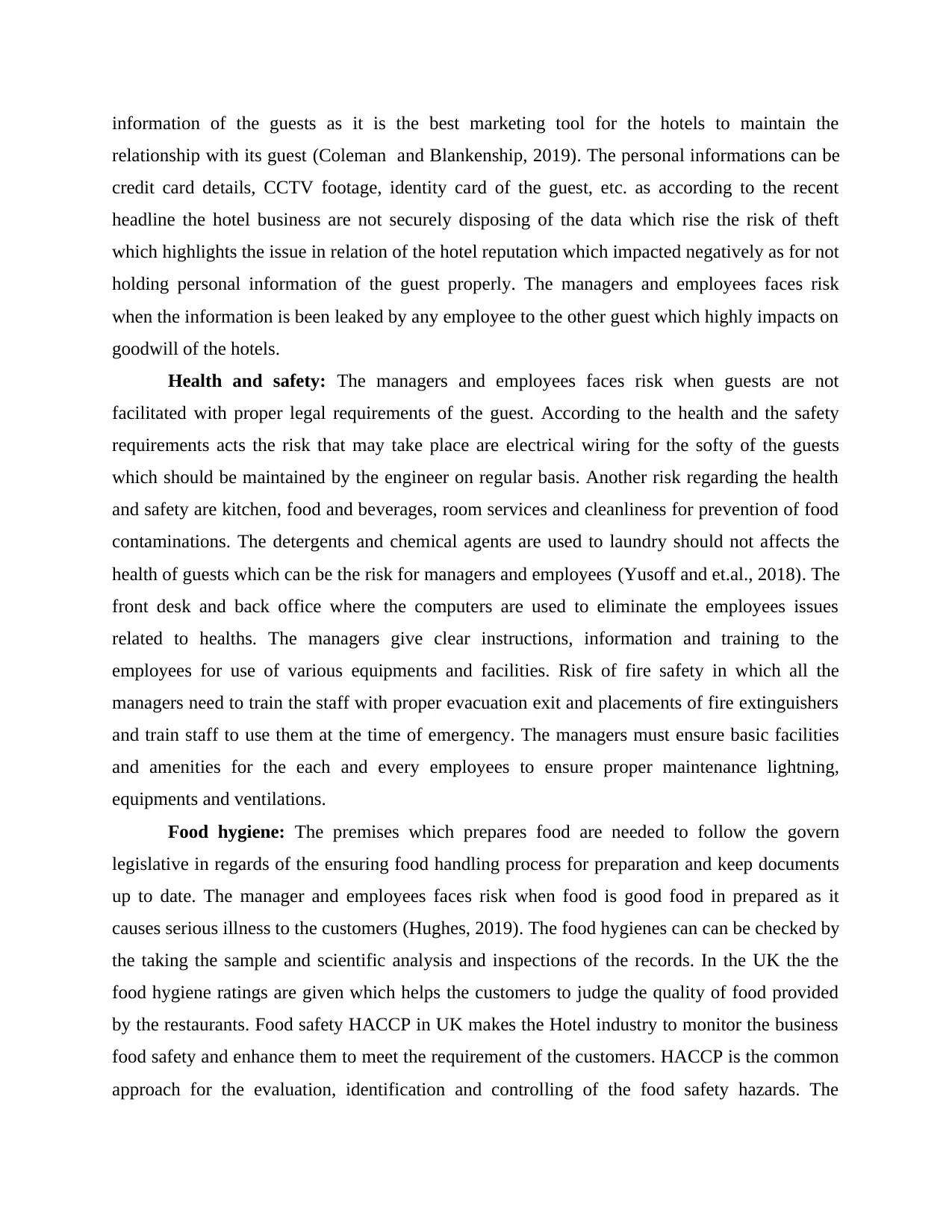
information of the guests as it is the best marketing tool for the hotels to maintain the
relationship with its guest (Coleman and Blankenship, 2019). The personal informations can be
credit card details, CCTV footage, identity card of the guest, etc. as according to the recent
headline the hotel business are not securely disposing of the data which rise the risk of theft
which highlights the issue in relation of the hotel reputation which impacted negatively as for not
holding personal information of the guest properly. The managers and employees faces risk
when the information is been leaked by any employee to the other guest which highly impacts on
goodwill of the hotels.
Health and safety: The managers and employees faces risk when guests are not
facilitated with proper legal requirements of the guest. According to the health and the safety
requirements acts the risk that may take place are electrical wiring for the softy of the guests
which should be maintained by the engineer on regular basis. Another risk regarding the health
and safety are kitchen, food and beverages, room services and cleanliness for prevention of food
contaminations. The detergents and chemical agents are used to laundry should not affects the
health of guests which can be the risk for managers and employees (Yusoff and et.al., 2018). The
front desk and back office where the computers are used to eliminate the employees issues
related to healths. The managers give clear instructions, information and training to the
employees for use of various equipments and facilities. Risk of fire safety in which all the
managers need to train the staff with proper evacuation exit and placements of fire extinguishers
and train staff to use them at the time of emergency. The managers must ensure basic facilities
and amenities for the each and every employees to ensure proper maintenance lightning,
equipments and ventilations.
Food hygiene: The premises which prepares food are needed to follow the govern
legislative in regards of the ensuring food handling process for preparation and keep documents
up to date. The manager and employees faces risk when food is good food in prepared as it
causes serious illness to the customers (Hughes, 2019). The food hygienes can can be checked by
the taking the sample and scientific analysis and inspections of the records. In the UK the the
food hygiene ratings are given which helps the customers to judge the quality of food provided
by the restaurants. Food safety HACCP in UK makes the Hotel industry to monitor the business
food safety and enhance them to meet the requirement of the customers. HACCP is the common
approach for the evaluation, identification and controlling of the food safety hazards. The
relationship with its guest (Coleman and Blankenship, 2019). The personal informations can be
credit card details, CCTV footage, identity card of the guest, etc. as according to the recent
headline the hotel business are not securely disposing of the data which rise the risk of theft
which highlights the issue in relation of the hotel reputation which impacted negatively as for not
holding personal information of the guest properly. The managers and employees faces risk
when the information is been leaked by any employee to the other guest which highly impacts on
goodwill of the hotels.
Health and safety: The managers and employees faces risk when guests are not
facilitated with proper legal requirements of the guest. According to the health and the safety
requirements acts the risk that may take place are electrical wiring for the softy of the guests
which should be maintained by the engineer on regular basis. Another risk regarding the health
and safety are kitchen, food and beverages, room services and cleanliness for prevention of food
contaminations. The detergents and chemical agents are used to laundry should not affects the
health of guests which can be the risk for managers and employees (Yusoff and et.al., 2018). The
front desk and back office where the computers are used to eliminate the employees issues
related to healths. The managers give clear instructions, information and training to the
employees for use of various equipments and facilities. Risk of fire safety in which all the
managers need to train the staff with proper evacuation exit and placements of fire extinguishers
and train staff to use them at the time of emergency. The managers must ensure basic facilities
and amenities for the each and every employees to ensure proper maintenance lightning,
equipments and ventilations.
Food hygiene: The premises which prepares food are needed to follow the govern
legislative in regards of the ensuring food handling process for preparation and keep documents
up to date. The manager and employees faces risk when food is good food in prepared as it
causes serious illness to the customers (Hughes, 2019). The food hygienes can can be checked by
the taking the sample and scientific analysis and inspections of the records. In the UK the the
food hygiene ratings are given which helps the customers to judge the quality of food provided
by the restaurants. Food safety HACCP in UK makes the Hotel industry to monitor the business
food safety and enhance them to meet the requirement of the customers. HACCP is the common
approach for the evaluation, identification and controlling of the food safety hazards. The
Paraphrase This Document
Need a fresh take? Get an instant paraphrase of this document with our AI Paraphraser
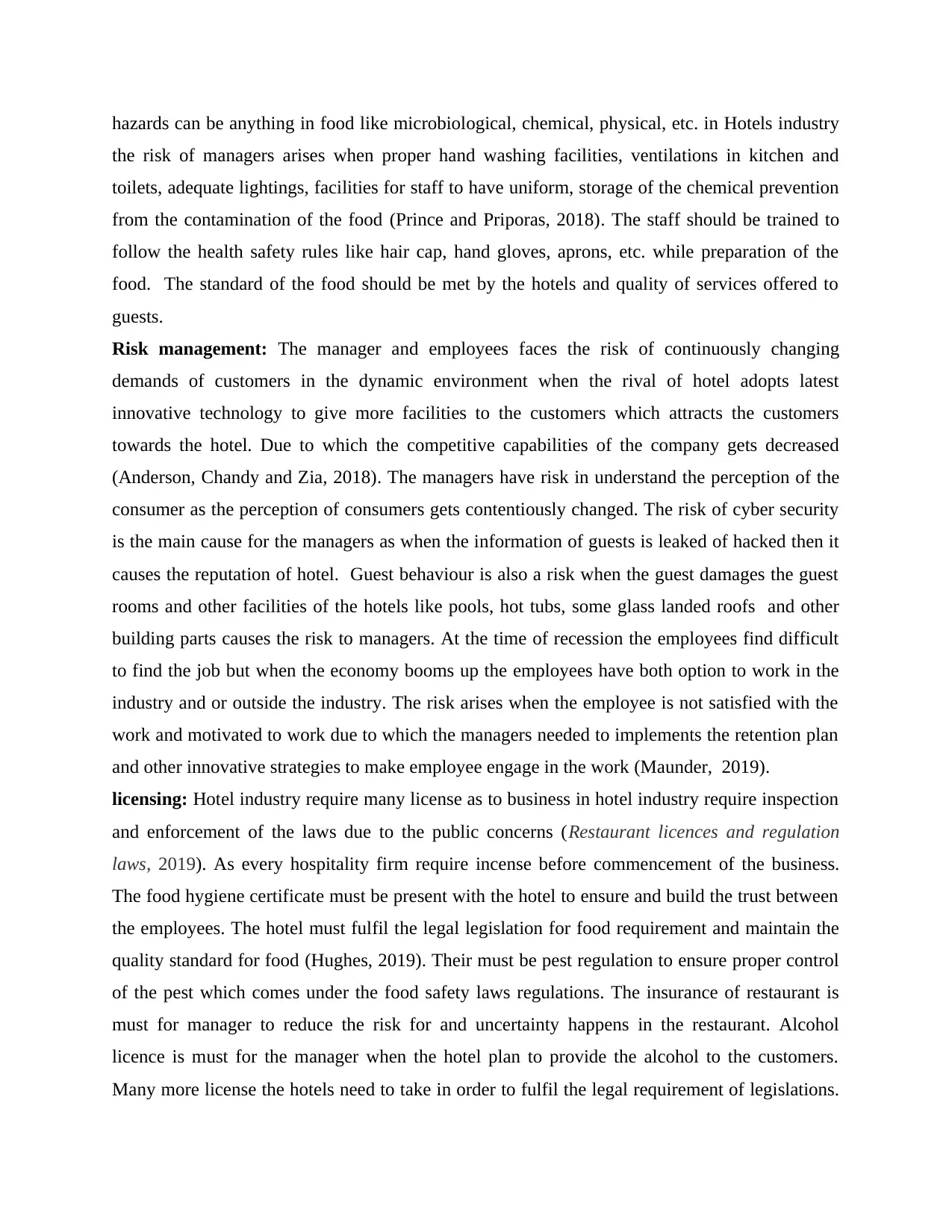
hazards can be anything in food like microbiological, chemical, physical, etc. in Hotels industry
the risk of managers arises when proper hand washing facilities, ventilations in kitchen and
toilets, adequate lightings, facilities for staff to have uniform, storage of the chemical prevention
from the contamination of the food (Prince and Priporas, 2018). The staff should be trained to
follow the health safety rules like hair cap, hand gloves, aprons, etc. while preparation of the
food. The standard of the food should be met by the hotels and quality of services offered to
guests.
Risk management: The manager and employees faces the risk of continuously changing
demands of customers in the dynamic environment when the rival of hotel adopts latest
innovative technology to give more facilities to the customers which attracts the customers
towards the hotel. Due to which the competitive capabilities of the company gets decreased
(Anderson, Chandy and Zia, 2018). The managers have risk in understand the perception of the
consumer as the perception of consumers gets contentiously changed. The risk of cyber security
is the main cause for the managers as when the information of guests is leaked of hacked then it
causes the reputation of hotel. Guest behaviour is also a risk when the guest damages the guest
rooms and other facilities of the hotels like pools, hot tubs, some glass landed roofs and other
building parts causes the risk to managers. At the time of recession the employees find difficult
to find the job but when the economy booms up the employees have both option to work in the
industry and or outside the industry. The risk arises when the employee is not satisfied with the
work and motivated to work due to which the managers needed to implements the retention plan
and other innovative strategies to make employee engage in the work (Maunder, 2019).
licensing: Hotel industry require many license as to business in hotel industry require inspection
and enforcement of the laws due to the public concerns (Restaurant licences and regulation
laws, 2019). As every hospitality firm require incense before commencement of the business.
The food hygiene certificate must be present with the hotel to ensure and build the trust between
the employees. The hotel must fulfil the legal legislation for food requirement and maintain the
quality standard for food (Hughes, 2019). Their must be pest regulation to ensure proper control
of the pest which comes under the food safety laws regulations. The insurance of restaurant is
must for manager to reduce the risk for and uncertainty happens in the restaurant. Alcohol
licence is must for the manager when the hotel plan to provide the alcohol to the customers.
Many more license the hotels need to take in order to fulfil the legal requirement of legislations.
the risk of managers arises when proper hand washing facilities, ventilations in kitchen and
toilets, adequate lightings, facilities for staff to have uniform, storage of the chemical prevention
from the contamination of the food (Prince and Priporas, 2018). The staff should be trained to
follow the health safety rules like hair cap, hand gloves, aprons, etc. while preparation of the
food. The standard of the food should be met by the hotels and quality of services offered to
guests.
Risk management: The manager and employees faces the risk of continuously changing
demands of customers in the dynamic environment when the rival of hotel adopts latest
innovative technology to give more facilities to the customers which attracts the customers
towards the hotel. Due to which the competitive capabilities of the company gets decreased
(Anderson, Chandy and Zia, 2018). The managers have risk in understand the perception of the
consumer as the perception of consumers gets contentiously changed. The risk of cyber security
is the main cause for the managers as when the information of guests is leaked of hacked then it
causes the reputation of hotel. Guest behaviour is also a risk when the guest damages the guest
rooms and other facilities of the hotels like pools, hot tubs, some glass landed roofs and other
building parts causes the risk to managers. At the time of recession the employees find difficult
to find the job but when the economy booms up the employees have both option to work in the
industry and or outside the industry. The risk arises when the employee is not satisfied with the
work and motivated to work due to which the managers needed to implements the retention plan
and other innovative strategies to make employee engage in the work (Maunder, 2019).
licensing: Hotel industry require many license as to business in hotel industry require inspection
and enforcement of the laws due to the public concerns (Restaurant licences and regulation
laws, 2019). As every hospitality firm require incense before commencement of the business.
The food hygiene certificate must be present with the hotel to ensure and build the trust between
the employees. The hotel must fulfil the legal legislation for food requirement and maintain the
quality standard for food (Hughes, 2019). Their must be pest regulation to ensure proper control
of the pest which comes under the food safety laws regulations. The insurance of restaurant is
must for manager to reduce the risk for and uncertainty happens in the restaurant. Alcohol
licence is must for the manager when the hotel plan to provide the alcohol to the customers.
Many more license the hotels need to take in order to fulfil the legal requirement of legislations.
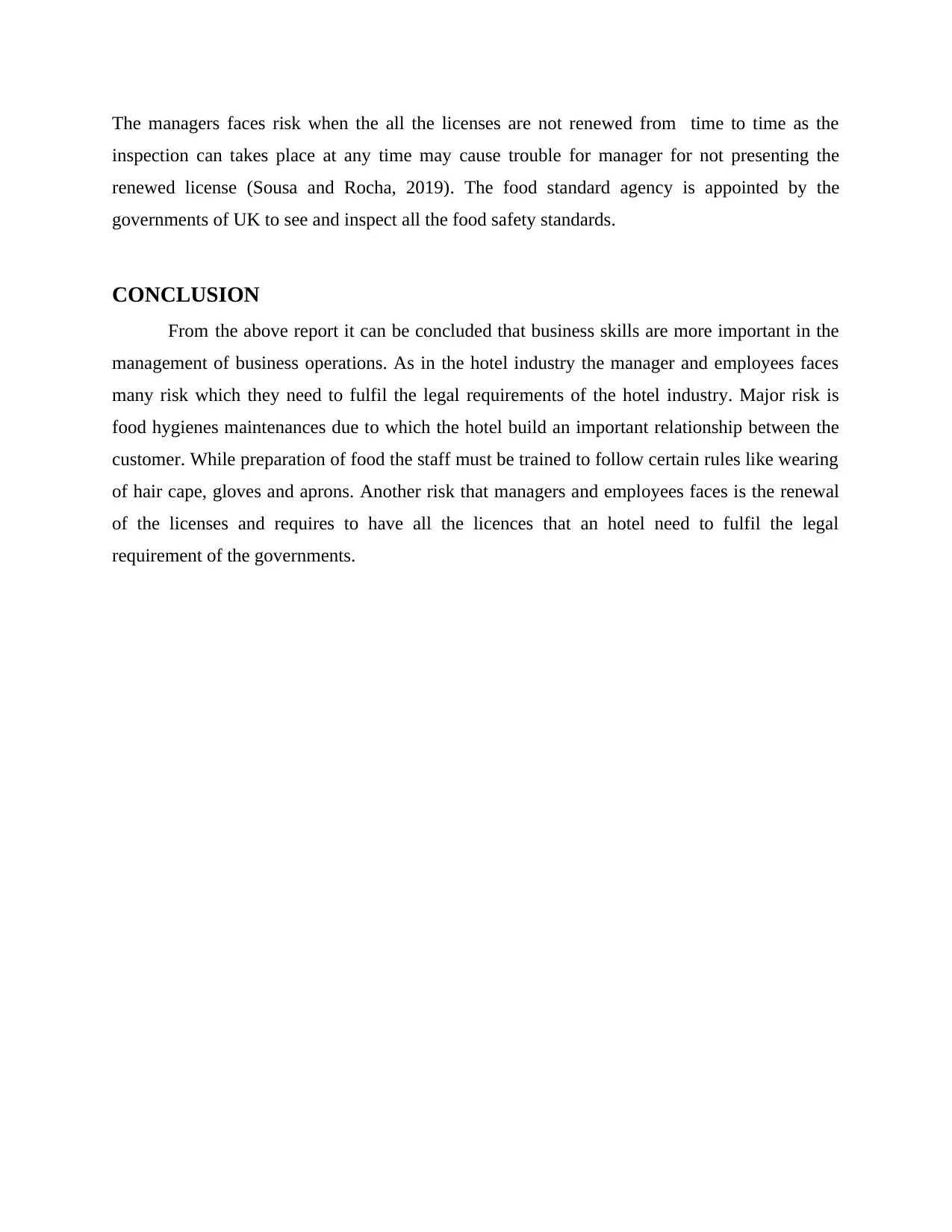
The managers faces risk when the all the licenses are not renewed from time to time as the
inspection can takes place at any time may cause trouble for manager for not presenting the
renewed license (Sousa and Rocha, 2019). The food standard agency is appointed by the
governments of UK to see and inspect all the food safety standards.
CONCLUSION
From the above report it can be concluded that business skills are more important in the
management of business operations. As in the hotel industry the manager and employees faces
many risk which they need to fulfil the legal requirements of the hotel industry. Major risk is
food hygienes maintenances due to which the hotel build an important relationship between the
customer. While preparation of food the staff must be trained to follow certain rules like wearing
of hair cape, gloves and aprons. Another risk that managers and employees faces is the renewal
of the licenses and requires to have all the licences that an hotel need to fulfil the legal
requirement of the governments.
inspection can takes place at any time may cause trouble for manager for not presenting the
renewed license (Sousa and Rocha, 2019). The food standard agency is appointed by the
governments of UK to see and inspect all the food safety standards.
CONCLUSION
From the above report it can be concluded that business skills are more important in the
management of business operations. As in the hotel industry the manager and employees faces
many risk which they need to fulfil the legal requirements of the hotel industry. Major risk is
food hygienes maintenances due to which the hotel build an important relationship between the
customer. While preparation of food the staff must be trained to follow certain rules like wearing
of hair cape, gloves and aprons. Another risk that managers and employees faces is the renewal
of the licenses and requires to have all the licences that an hotel need to fulfil the legal
requirement of the governments.
⊘ This is a preview!⊘
Do you want full access?
Subscribe today to unlock all pages.

Trusted by 1+ million students worldwide
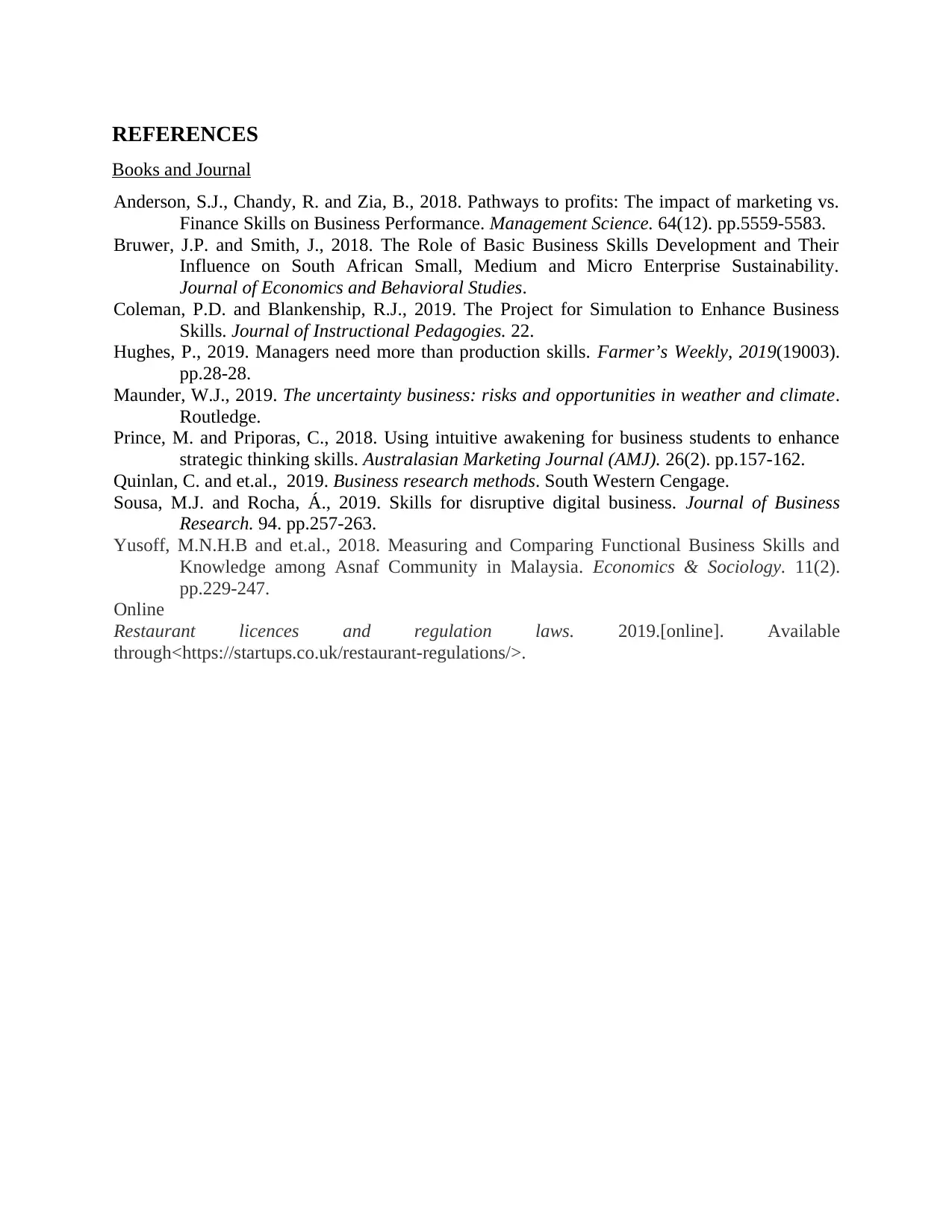
REFERENCES
Books and Journal
Anderson, S.J., Chandy, R. and Zia, B., 2018. Pathways to profits: The impact of marketing vs.
Finance Skills on Business Performance. Management Science. 64(12). pp.5559-5583.
Bruwer, J.P. and Smith, J., 2018. The Role of Basic Business Skills Development and Their
Influence on South African Small, Medium and Micro Enterprise Sustainability.
Journal of Economics and Behavioral Studies.
Coleman, P.D. and Blankenship, R.J., 2019. The Project for Simulation to Enhance Business
Skills. Journal of Instructional Pedagogies. 22.
Hughes, P., 2019. Managers need more than production skills. Farmer’s Weekly, 2019(19003).
pp.28-28.
Maunder, W.J., 2019. The uncertainty business: risks and opportunities in weather and climate.
Routledge.
Prince, M. and Priporas, C., 2018. Using intuitive awakening for business students to enhance
strategic thinking skills. Australasian Marketing Journal (AMJ). 26(2). pp.157-162.
Quinlan, C. and et.al., 2019. Business research methods. South Western Cengage.
Sousa, M.J. and Rocha, Á., 2019. Skills for disruptive digital business. Journal of Business
Research. 94. pp.257-263.
Yusoff, M.N.H.B and et.al., 2018. Measuring and Comparing Functional Business Skills and
Knowledge among Asnaf Community in Malaysia. Economics & Sociology. 11(2).
pp.229-247.
Online
Restaurant licences and regulation laws. 2019.[online]. Available
through<https://startups.co.uk/restaurant-regulations/>.
Books and Journal
Anderson, S.J., Chandy, R. and Zia, B., 2018. Pathways to profits: The impact of marketing vs.
Finance Skills on Business Performance. Management Science. 64(12). pp.5559-5583.
Bruwer, J.P. and Smith, J., 2018. The Role of Basic Business Skills Development and Their
Influence on South African Small, Medium and Micro Enterprise Sustainability.
Journal of Economics and Behavioral Studies.
Coleman, P.D. and Blankenship, R.J., 2019. The Project for Simulation to Enhance Business
Skills. Journal of Instructional Pedagogies. 22.
Hughes, P., 2019. Managers need more than production skills. Farmer’s Weekly, 2019(19003).
pp.28-28.
Maunder, W.J., 2019. The uncertainty business: risks and opportunities in weather and climate.
Routledge.
Prince, M. and Priporas, C., 2018. Using intuitive awakening for business students to enhance
strategic thinking skills. Australasian Marketing Journal (AMJ). 26(2). pp.157-162.
Quinlan, C. and et.al., 2019. Business research methods. South Western Cengage.
Sousa, M.J. and Rocha, Á., 2019. Skills for disruptive digital business. Journal of Business
Research. 94. pp.257-263.
Yusoff, M.N.H.B and et.al., 2018. Measuring and Comparing Functional Business Skills and
Knowledge among Asnaf Community in Malaysia. Economics & Sociology. 11(2).
pp.229-247.
Online
Restaurant licences and regulation laws. 2019.[online]. Available
through<https://startups.co.uk/restaurant-regulations/>.
1 out of 7
Related Documents
Your All-in-One AI-Powered Toolkit for Academic Success.
+13062052269
info@desklib.com
Available 24*7 on WhatsApp / Email
![[object Object]](/_next/static/media/star-bottom.7253800d.svg)
Unlock your academic potential
Copyright © 2020–2026 A2Z Services. All Rights Reserved. Developed and managed by ZUCOL.




